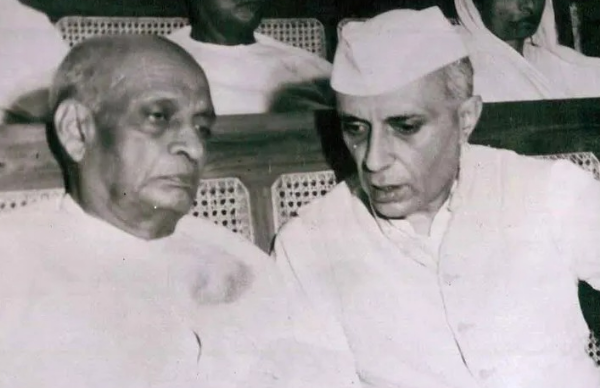Patel’s Warning to Nehru: The First Alarm against National Herald
In a series of letters to then Prime Minister Jawaharlal Nehru, Sardar Vallabhbhai Patel expressed grave concerns about the National Herald’s financial dealings and warned against potential misuse of political influence in fundraising.
Total Views |
The National Herald saga, once buried under decades of post-Independence political whitewash, has roared back into the national spotlight, this time with a money trail leading directly to the Gandhi family. The Enforcement Directorate (ED) has accused Sonia Gandhi and Rahul Gandhi of orchestrating a covert operation to divert assets worth Rs 5,000 crore. This is not just another case, it is a textbook example of the Congress party’s long-standing legacy of corruption, dynastic entitlement, and political privilege.

But the roots of this trace back much further, specifically, to 1950, when Sardar Vallabhbhai Patel, India’s Iron Man, first sounded the alarm. In a series of letters to then Prime Minister Jawaharlal Nehru, now preserved in Sardar Patel’s Correspondence, Patel expressed grave concerns about the National Herald’s financial dealings and warned against potential misuse of political influence in fundraising. His warnings, however, were met with evasion and vague reassurances—an early indication of the accountability vacuum that critics claim still defines the Congress party.
A Lettered Warning from the Iron Man
On May 5, 1950, Patel wrote to Nehru about a suspicious ₹75,000 donation to the National Herald from individuals linked to Himalayan Airways. It is a company that had secured a government contract despite objections from the Indian Air Force. One of the donors, Akhani, was reportedly involved in bank fraud. Patel also flagged concerns about Union Minister Ahmed Kidwai, who was allegedly soliciting funds from controversial businessmen, including J.P. Srivastava of Lucknow.
Nehru’s response, sent the same day, was ambiguous. He distanced himself from the Herald’s financial affairs and said he had asked his son-in-law, Feroze Gandhi, then the newspaper’s General Manager, to look into the matter. To Patel, this lack of ownership was alarming.
Undeterred, Patel responded the next day. In his May 6 letter, he bluntly stated that the donations lacked any element of charity and were, instead, rooted in private interests. Nehru replied once more, claiming he hadn’t been involved with the paper’s finances for three years and had delegated responsibility to someone named Mridula. While he admitted “some mistakes may have occurred,” he brushed off Patel’s concerns by calling it a matter of "profit and loss"—not ethics.
Fast Forward: A Case of Political Privilege?
Decades later, those very warnings have taken a tangible form in what the ED describes as a multi-crore scam, cleverly disguised as corporate restructuring. Sonia and Rahul Gandhi, through their control of Young Indian Pvt. Ltd., are alleged to have acquired the National Herald’s assets worth thousands of crores without paying even a fraction of the market value. According to the ED, this was no case of oversight but a calculated abuse of political privilege for personal enrichment.
The charges echo the long-standing warnings of Dr. Subramanian Swamy, the senior BJP leader and petitioner in the case. Swamy has consistently alleged a systematic conspiracy by the Gandhis to siphon off public assets under the guise of a private company. His campaign has found resonance with the BJP’s broader narrative: that the Congress party has long functioned more like a dynastic enterprise than a democratic institution.
The National Herald case has thus evolved beyond its legal framework. It has become a symbolic battleground—between transparency and entitlement, between institutional integrity and dynastic arrogance. And for many, it is a reminder that the seeds of today’s controversies were sown not yesterday, but over seventy years ago—when one founding father tried to course-correct another, only to be ignored.


